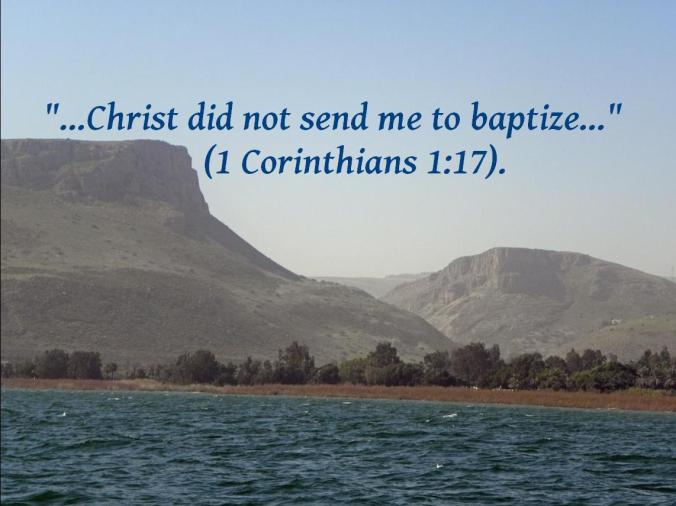“Go therefore and make disciples of all the nations…teaching them to observe all that I commanded you; and lo, I am with you always, even to the end of the age” (Matthew 28:19-20, NASB).
——————–
Contents:
1) “In Malice Be Ye Children” (R.J. Evans)
2) Discouragement (Steven Harper)
——————–

-1-
“In Malice Be Ye Children”
R.J. Evans
In 1 Corinthians 14, Paul gave the brethren at Corinth proper instruction concerning the exercising of spiritual gifts. The main problem was how the Corinthians had been conducting themselves with regard to the gift of tongues. The Corinthians were being childish in that they delighted in the gift of tongues to the extent that proper judgment was not being used concerning the effect tongue speaking was having on others. Like children, they failed to see all that was involved in the inconsiderate use and display which they had been making of this gift. Hence, Paul wrote, “Brethren, be not children in understanding: howbeit in malice be ye children, but in understanding be men” (1 Cor. 14:20). To be like children in understanding is to act as though the mind is still in the undeveloped stage of childhood. So, instead of acting childish, they were told to be “men, ” that is, be mature. This suggests the idea of “having reached the goal.” It involves being fully able to use one’s powers of thought and good judgment. The Corinthians had not been doing this with regard to spiritual gifts.
The circumstances today are different from those found in 1 Corinthians 14. We no longer have spiritual gifts, for they have ceased (1 Cor. 13:8-13). But, the principles set forth in 1 Corinthians 14:20 still apply and must be heeded by those of us who are Christians. We must not be childish in understanding. However, in this article I would like for us to notice in particular the phrase — “in malice be ye children. ” Malice is an evil disposition with the intention of injuring others. It is among the most destructive of all ugly attitudes. It is in this respect that it would be creditable to Christians to be “children.” In fact, Jesus lays down this condition, “Except ye be converted, and become as little children, ye shall not enter into the kingdom of heaven” (Matt. 18:3). This suggests humility, gentleness and the innocence of children, which, particularly is contrary to malice, envy, anger, strife, etc.
Those of us who seek happiness and success in serving God must eliminate malice from our hearts. There is no place in the life of a Christian for malice. Please notice the words of the inspired apostle Peter: “Wherefore laying aside all malice, and all guile, and hypocrisies, and envies, and all evil speakings” (1 Pet. 2:1). The apostle Paul said: “Let all bitterness, and wrath, and anger, and clamor, and evil speaking, be put away from you, with all malice. And be ye kind one to another, tenderhearted, forgiving one another, even as God for Christ’s sake hath forgiven you” (Eph. 4:31-32).
Malice is always harmful to those who harbor it, and usually damaging to the person who becomes the object of malicious words and deeds. Malice will destroy our personal happiness and damn our souls to eternal punishment. “Brethren . . . in malice be ye children.”
— Via Guardian of Truth, XXXII, 13, p. 388, July 7, 1988
——————–

-2-
Discouragement
Steven Harper
Some disciples have an erroneous idea that it is somehow sinful for a follower of God to be discouraged, even for a moment. This idea is probably a result of so much teaching and preaching on the idea that Christians should not be discouraged, or that we have so many blessings, we don’t really have cause for discouragement. However this might come to be accepted, the idea is taking the truth a little further than need be, because discouragement in itself is not sinful. There are some consequences of discouragement that may certainly be unwelcome and not beneficial to the people of God, but that is another issue altogether.
Discouragement, by definition, means to deprive of confidence, hope, or spirit; to dissuade or deter; and to hamper; hinder. In spiritual matters, discouragement cannot be a good thing, especially if one continues in the state without addressing the cause. Someone may discourage another because of harsh words or ungodly behavior; others may be discouraged because they are facing hardships and persecution; still others may simply be discouraged because they are not at the level of spiritual maturity they desire. In each case and in every situation, however, the problem must be addressed and the one who is discouraged must be given a solution for the discouragement.
But first, let us note that some very godly people have been discouraged at times — sometimes justifiably so — but in all cases, God had an answer. The point we should learn from this is that if we face disappointments and discouragement, God has an answer for us, too. He has given us an answer to every cause for which His people may be discouraged.
David
Psalm 142
Here, the one we know as a man after God’s own heart, admits, “my spirit was overwhelmed within me” (Psalm 142:3). His plea to the Lord in this is the fact that none stand with him in his trials, and feels abandoned. He says, “Look on my right hand and see, for there is no one who acknowledges me; refuge has failed me; no one cares for my soul” (Psalm 142:4). He also said, “Attend to my cry, for I am brought very low; Deliver me from my persecutors, for they are stronger than I” (Psalm 142:6). On this occasion, David was discouraged by the lack of support from his fellow man, not unlike the plight many Christians experience even today.
But note that David finds solace in another place: God. In that same psalm where he speaks of his discouragement with man, he speaks the praise of God, who had never — and would never — forsake him. He cries out to God with the confident assurance, “You are my refuge, my portion in the land of the living” (Psalm 142:5). While others may have abandoned him in his time of need, David knew that God would always be with him — a promise made to God’s people even today (Hebrews 13:5). If you are ever discouraged because it seems like your closest friends have abandoned you in times of trouble, just remember this promise God has given and reclaim your hope. There is no reason to remain discouraged!
Psalm 32, 38
On another occasion, David again felt discouragement, but it was of his own doing. Here, he writes, “When I kept silent, my bones grew old through my groaning all the day long. For day and night Your hand was heavy upon me; My vitality was turned into the drought of summer” (Psalm 32:3,4). And, “I am troubled, I am bowed down greatly; I go mourning all the day long. For my loins are full of inflammation, and there is no soundness in my flesh. I am feeble and severely broken; I groan because of the turmoil of my heart. Lord, all my desire is before You; and my sighing is not hidden from You. My heart pants, my strength fails me; as for the light of my eyes, it also has gone from me. My loved ones and my friends stand aloof from my plague, and my relatives stand afar off” (Psalm 38:7-11). This time, the cause for David’s discouragement and sorrow was his own sin! He recognized that, guilty, he stood under the heavy weight of God’s hand [guilt for his sin] and he also recognized that others saw his sin, too, and were ashamed to be near him.
But, again, David also recognized there was a way out of this condition. In these same psalms, he recognized, “Blessed is he whose transgression is forgiven, whose sin is covered” (Psalm 32:1). And because he knew this, he could say, “I acknowledged my sin to You, and my iniquity I have not hidden. I said, ‘I will confess my transgressions to the Lord,’ and You forgave the iniquity of my sin” (Psalm 32:5). He could also say, “For in You, O Lord, I hope; You will hear, O Lord my God” (Psalm 38:15). Even in such a discouraging situation — where you know you have sinned against God and even others know you have sinned against God — there was hope in the knowledge God answered his request and the confidence he could be forgiven.
As children of God today [disciples of Jesus Christ], we have that same confidence! John tells the one who is already a Christian, “If we say that we have no sin, we deceive ourselves, and the truth is not in us” (I John 1:8). But he doesn’t stop there with words that might be a source of discouragement to all; he goes on to say, “If we confess our sins, He is faithful and just to forgive us our sins and to cleanse us from all unrighteousness” (I John 1:9). In Christ, we have the promise that, should we sin and should we repent and confess those sins, we will be forgiven and cleansed from all unrighteousness! Again, there is no reason to remain discouraged!
Elijah (I Kings 19)
At this time in Elijah’s life, things were very bleak for a man of God. Ahab was king of Israel and Jezebel was his wicked queen. Ahab was said to have done “more to provoke the Lord God of Israel to anger than all the kings of Israel who were before him” (I Kings 16:33). [Not a small accomplishment!] He followed after false gods, built a temple for them in Samaria and erected an idol in that temple. Apparently, they were very closely tied to the false prophets of these false gods, for they ate at the table of Jezebel (I Kings 18:19). If that wasn’t enough, Jezebel had massacred the prophets of God (I Kings 18:4) and those who escaped were hiding in caves.
But Elijah met those false prophets on Mt. Carmel and the Lord delivered a decisive victory over them (I Kings 18:20-40). Yet for all this, Jezebel still sought the life of Elijah and, immediately following this great victory for the Lord, Elijah fled into the wilderness (I Kings 19:1-4). It was here that Elijah stopped long enough to think about his situation and began to get discouraged. He even prayed that his life might be taken because he had seen and faced enough.
But while there in the wilderness, God came to him and asked why he was there. Elijah answered, “I alone am left; and they seek to take my life” (I Kings 19:10). When God came to him again in the still, small voice and again asked why he was there, Elijah gave the same dejected answer: “I alone am left; and they seek to take my life” (I Kings 19:14).
But God had an answer for that, too! He revealed to Elijah, “Yet I have reserved seven thousand in Israel, all whose knees have not bowed to Baal, and every mouth that has not kissed him” (I Kings 19:18). And today, many Christians feel this sense of discouragement, thinking they are “alone” in a world of ungodliness; but, once again, God has an answer. Just remember there are many today who have not “bowed the knee” to worldliness and who are faithfully serving God where they are.
Whatever situation we may face — even if it seems like we have lost all hope — there is no reason to remain discouraged. Remember God is near, and in His Word we may find hope again.
— Via articles from the La Vista church of Christ
——————–
The Steps That Lead to Eternal Salvation
1) Hear the gospel, for that is how faith comes (Rom. 10:17; John 20:30,31).
2) Believe in the deity of Christ (John 8:24; John 3:18).
3) Repent of sins (Luke 13:5; Acts 17:30).
4) Confess faith in Christ (Rom. 10:9,10; Acts 8:36-38).
5) Be baptized in water for the remission of sins (Mark 16:16; Acts 2:38; 22:16; Rom. 6:3,4; Gal. 3:26,27; 1 Pet. 3:21).
6) Continue in the faith; for, if not, salvation can be lost (Heb. 10:36-39; Rev. 2:10; 2 Pet. 2:20-22).
——————–
Tebeau Street
CHURCH OF CHRIST
1402 Tebeau Street, Waycross, GA 31501
Sunday services: 9:00 AM (Bible class); 10 AM & 5 PM (worship)
Wednesday: 7 PM (Bible class)
evangelist/editor: Tom Edwards (912) 281-9917
Tom@ThomasTEdwards.com
http://thomastedwards.com/go (Older version of Gospel Observer without pictures)
http://ThomasTEdwards.com/audioser.html (audio sermons)



